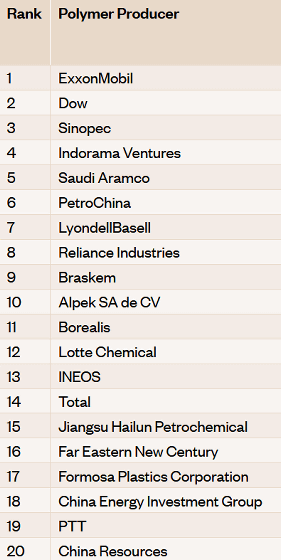55% of disposable plastics that cause environmental pollution are made by only 20 companies

Most disposable plastics such as PET bottles and food packaging are incinerated or landfilled, which not only causes marine pollution but also affects global warming. The Mindaloo Foundation , an Australian charity, has created a ranking of the 'Top 100 Disposable Plastic Manufacturers' for such disposable plastics.
Executive Summary | The Minderoo Foundation
https://www.minderoo.org/plastic-waste-makers-index/findings/executive-summary/
Just 20 Companies Produce Over 55% of All Single-Use Plastic Waste in The World
https://www.sciencealert.com/just-20-companies-produce-over-half-of-all-single-use-plastic-waste-report-shows
Half of single-use plastic waste produced by just 20 companies --CNN
https://edition.cnn.com/2021/05/18/world/single-use-plastics-scli-intl/
When discussing environmental pollution from plastic waste, the focus is generally on manufacturers who wrap their products in disposable plastics and retailers who provide shoppers with plastic bags. In the past, the 'ranking of companies that pollute the world with plastic waste' has also been released from the manufacturer name printed on the plastic waste collected in each country. Beverage and food manufacturers such as Coca-Cola, Nestle and PepsiCo rank high in this survey, published in 2019.
The ranking of companies that pollute the world with plastic is released --GIGAZINE

However, these manufacturers do not actually manufacture the plastic itself, and there are other manufacturers that manufacture plastic from the fossil fuel that is the raw material. Therefore, a research team supported by the Mindaloo Foundation conducted a survey focusing on manufacturers that produce plastics from fossil fuels.
The research team manufactures polypropylene (PP) , high-density polyethylene (HDPE) , low-density polyethylene (LDPE) , linear polyethylene (LLDPE), and polyethylene terephthalate (PET) , which are the main materials for disposable plastics. I investigated the facilities of things. As a result, it was found that these facilities were owned by about 300 different companies, and the top 100 companies produced about 90% of the world's disposable plastics. In addition, the top 20 plastic manufacturers alone produced about 55% of plastic waste.
The top 20 plastic manufacturers reported by the research team are as follows. ExxonMobil in 1st place and Dow in 2nd place are American companies, and Sinopec (Sinopec) in 3rd place is a Chinese company, each of which produces more than 5 million tons of disposable plastics annually. That is. 'We share social concerns about plastic waste and agree that we must address it,' ExxonMobil said in response to CNN's inquiry. He said that addressing the problem requires the cooperation of businesses, governments, environmental groups and consumers, and has already helped improve recyclability and collect plastic waste.

'Today's regulations are primarily aimed at tens of thousands of companies that sell finished products using disposable plastics,' the research team said, noting that major producers are not receiving much attention in the plastics issue. .. 'An effective solution to the plastic waste crisis is to address the problem through a plastic manufacturer at the heart of a relatively small supply chain,' he said, affecting the entire supply chain by working with plastic manufacturers. Insisted that it is possible to exert.
The study also looked at not only the manufacturers that actually produce plastics from fossil fuels, but also the banks that financed these manufacturers. As a result, it was found that the top five banks that fund plastic manufacturers are all based in the United States or the United Kingdom.

In 2019, 130 million tons of disposable plastic will be disposed of worldwide, 35% of which will be incinerated and 31% of which will be disposed of in controlled landfills, but 19% will be disposed of directly on land or sea. It is believed that it was done. In addition, greenhouse gas emissions from the life cycle of disposable plastics will account for 1.5% of the world's total greenhouse gas emissions in 2019.
In recent years, as fields such as power generation and transportation are moving away from fossil fuels and shifting to green energy, the proportion of plastic production in fossil fuel consumption is increasing. Plastic production capacity will continue to improve in the future, and it is possible that the global plastic production capacity will increase by more than 30% over the next five years. If the world achieves the goal of 'reducing the average global temperature rise to less than 2 degrees Celsius before the Industrial Revolution' set by the
The research team claims that the most important step in combating plastic waste is to increase the amount of 'plastic made from recycled materials' rather than new virgin polymers made from fossil fuels. At the time of writing the article, virgin polymers accounted for 98% of total plastic production, and only about 2% of plastics are made from recycled materials. If companies focus on making plastics from recycled materials rather than virgin polymers, the impact on the environment and climate can be mitigated.

Related Posts:
in Science, Posted by log1h_ik






